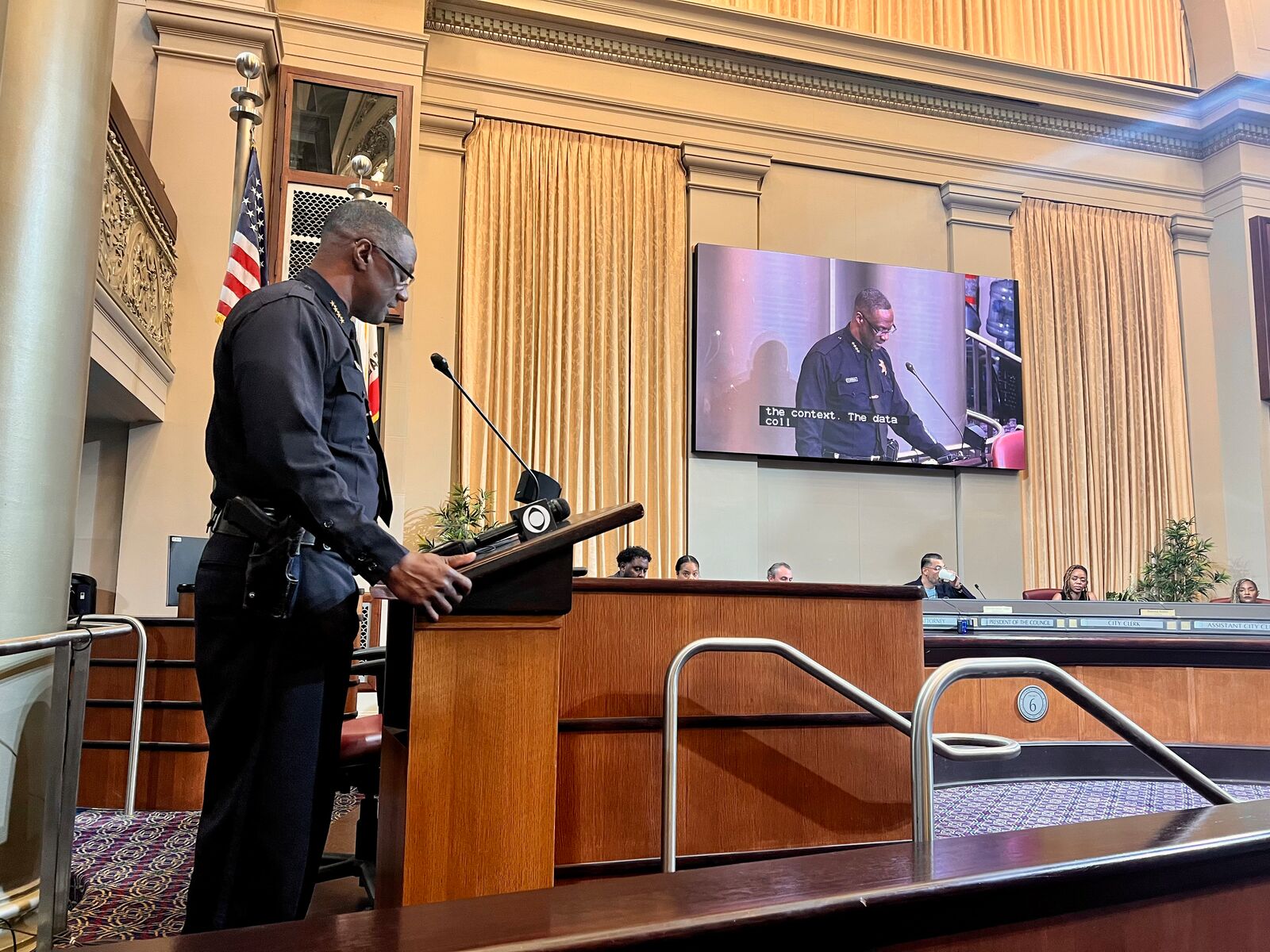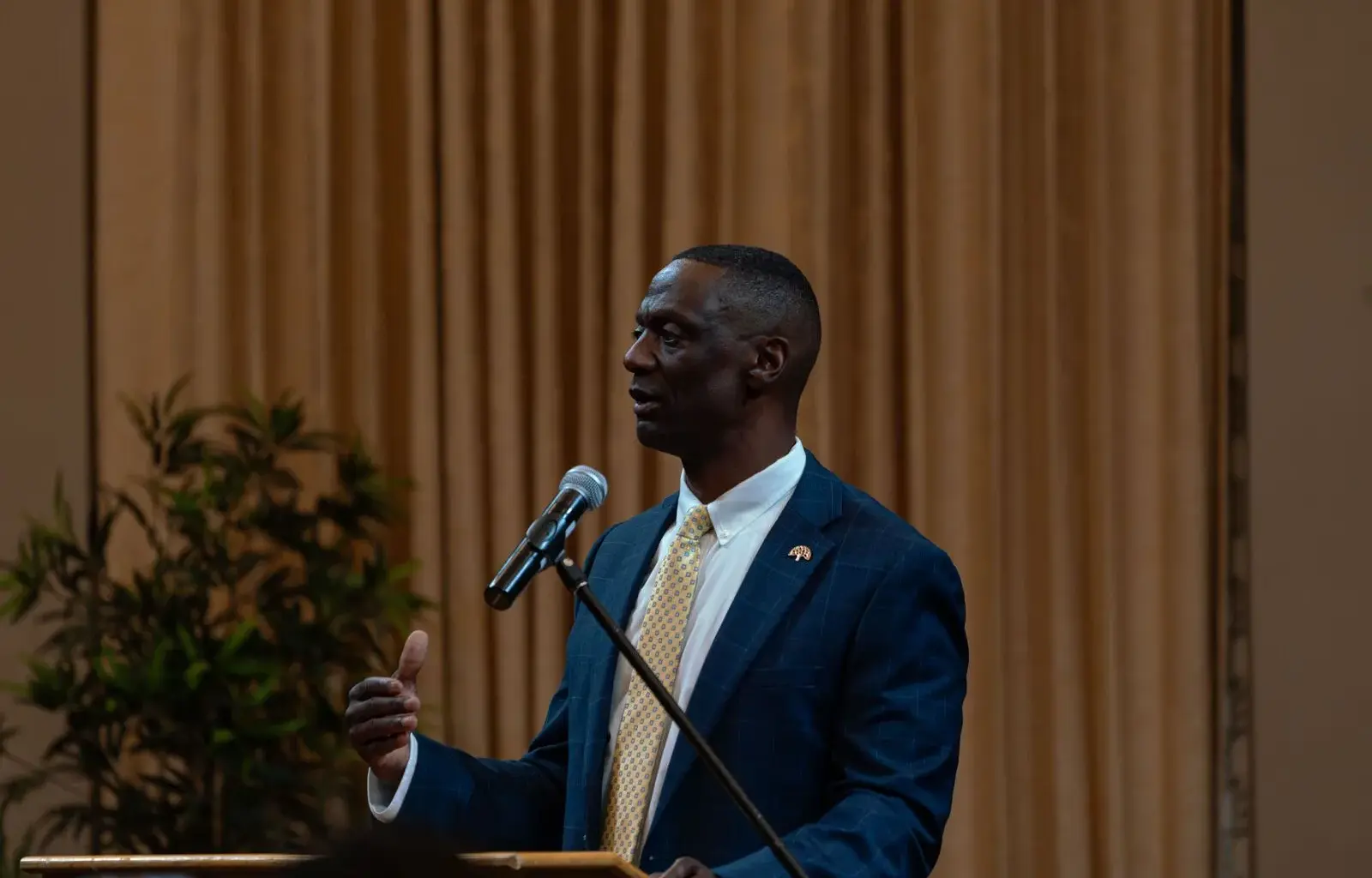After 17 months on the job, Oakland Police Chief Floyd Mitchell announced Wednesday that he is resigning effective Dec. 5.
While the chief did not publicly state his reasons for stepping down, some community members are blaming the Police Commission and police reform advocates for, in their view, making it harder for the chief and his officers to do their jobs.
At the Police Commission meeting Thursday night, several residents speculated that Mitchell left because he was frustrated with the volunteer civilian-run oversight body. Most who were critical of the commission submitted their comments virtually and had their comments read out loud by the commission’s chief of staff.
Mitchell did not attend the meeting.
“I do not blame the chief for leaving, because he’s been run out and obstructed by these activists who are off and on the dais,” said District 4 resident Rajni Mandal during the public comment portion of the meeting. She blamed the commission, the Coalition for Police Accountability, and the Anti Police-Terror Project for “plunging the city into chaos.”
“While our chief of police has not yet given reasons for his resignation, the number of obstacles driven by the commission and oversight to actually lead the force has to be a reason,” wrote resident Barbara Muir in her e-comment, read aloud by the commission’s chief of staff. “This is a no-win role under the current city structure.”
“While it’s too late for Chief Mitchell — unless, perhaps, the PC decides to disband — I hope you will have learned something from this nth cycle of wash, rinse, and discard chiefs,” resident Ben Ziegler wrote in his online comment.
Ricardo Garcia-Acosta, chair of the Police Commission, responded by saying he and his fellow commissioners worked in lockstep with Mitchell, helping him to change department policies and streamline the review process in officer investigations.
“Anybody who says that we’re against the chief … what you are doing is undermining the integrity of the force that we have — a force that’s understaffed, a force that does their best on the streets — and blaming us for the structural problems that exist in our community,” Garcia-Acosta told the public.
 Mitchell presents his proposed changes to OPD’s vehicle pursuit policy to the Police Commission on Sept. 25, 2025. Credit: Roselyn Romero/The Oaklandside
Mitchell presents his proposed changes to OPD’s vehicle pursuit policy to the Police Commission on Sept. 25, 2025. Credit: Roselyn Romero/The Oaklandside
In an interview with The Oaklandside, Garcia-Acosta said he feels that the public’s attacks on the commission are misplaced.
“We’re going to hear the same tired narrative that oversight makes policing impossible, and once again, we ran another chief out of the city,” he said. “If accountability and transparency are so much of a threat to policing, then maybe policing itself is the problem,” he said.
Anne Janks, member of the Coalition for Police Accountability, said in an interview that people who blame police oversight for Mitchell’s resignation fail to understand the patterns in previous OPD chiefs’ exits.
“The vast majority of chiefs that we’ve gone through have gone through scandals,” she said. “Oversight isn’t the problem; it’s that we have bad chiefs.”
At Thursday’s meeting, Lisa Ausmus, deputy chief of OPD’s Bureau of Risk Management, said she didn’t agree with all of the public’s comments about the Police Commission.
“We have put in a lot of time together,” Ausmus said. “We have worked diligently hand-in-hand.”
Other residents, like Mariano Contreras with the African American-Latino Action Alliance, hoped to diffuse the tension at the meeting by thanking commissioners.
“You’re here to make sure that Oakland Police Department does not go back to the 1990s, when they were running amok, planting evidence, beating people up, and a few years ago, raping a minor,” Contreras told the commission, referring to the 2016 case in which multiple OPD officers sexually exploited the daughter of a 911 dispatcher.
Millie Cleveland, steering committee chair for the Coalition for Police Accountability, told The Oaklandside that while she didn’t expect Mitchell to resign just 17 months into his post, she felt that he’d been unhappy with the job for some time. She pointed to Mitchell’s comments from past Police Commission meetings in which he said the “weaponization of the disciplinary process” made officers fearful of making mistakes.
“Nobody saw this coming,” Cleveland said. “There are people who say that he wasn’t a good fit. And there are people thinking he would just wait until he got fired.”
The Police Commission was actually instrumental in bringing Mitchell to Oakland. In February 2023, the board launched a nationwide search with help from an external recruiting firm, received guidance from the commission’s police chief search ad hoc committee, and conducted multiple rounds of interviews with candidates, including Mitchell.
In April 2024, the commission held a public forum where four candidates, including Mitchell, discussed their plans for leading the department. Mitchell told commissioners and the public that he grew up in a city with a history of policing issues in Black and brown communities, which has informed his view of constitutional policing. He added that he had experience working with civilian oversight bodies from his time as a patrol officer in Kansas City.
“It has given me vast knowledge and experience in working through some issues that affect these particular neighborhoods,” Mitchell said at the time.
During a September 2024 hearing as part of OPD’s federal oversight program, Mitchell, meeting the federal judge for the first time, said he would prioritize “working with our counsel, our commission, our civilian review agency to develop a long-term strategic plan to address the issues facing Oakland and its police department.”
Asked by the judge if anything had surprised him since being hired, Mitchell didn’t mention the commission or the intensity of civilian oversight. He focused instead on OPD’s staffing levels and how much work the department is asked to do with the low staffing relative to Oakland’s crime rate.
Who should be the next police chief?
 Former OPD Chief LeRonne Armstrong’s badge during a press conference on June 2, 2021. Credit: Amir Aziz/The Oaklandside
Former OPD Chief LeRonne Armstrong’s badge during a press conference on June 2, 2021. Credit: Amir Aziz/The Oaklandside
On Thursday, Loren Taylor, a former mayoral candidate and former District 6 councilmember, published an article on Substack calling for the reinstatement of former Chief LeRonne Armstrong.
Armstrong was fired by former Mayor Sheng Thao in 2023 after an investigation found that he failed to uphold OPD’s disciplinary standards, allowing for major oversights in a case involving a police sergeant who committed a hit-and-run, and later, in a separate incident, fired his gun inside an OPD headquarters elevator and tried to hide evidence of the gun discharge. Later, Armstrong was found to have committed a similar rules violation by not ensuring the integrity of the disciplinary process in a case involving a homicide investigator who allegedly committed perjury and bribed witnesses, resulting in two men’s prison sentences being overturned.
Armstrong is currently suing the city, arguing that his firing was retaliatory because he blew the whistle on what he believes is corruption by the federal court monitor who oversees OPD’s reform program.
“Now, with another resignation on our hands, we have the chance to correct the record and move forward with wisdom instead of incompetence and corruption,” Taylor wrote in his post promoting Armstrong as a candidate.
The Black Action Alliance, a group that launched last year leading up to the mayoral election, also voiced its support for Armstrong’s reinstatement.
“Appointing Former Chief Armstrong will enable OPD to continue its momentum in recruiting qualified officers and refining policies that best serve the public safety interests of the broader Oakland community,” wrote Sinclair Ridley-Thomas, CEO of Black Action Alliance, in a statement.
Ausmus, the deputy chief, said during Thursday’s Police Commission meeting that Mitchell is the 16th chief during her career at OPD.
“We, as the department, the leadership, the officers, and everybody else, are going to keep moving forward because that’s the expectation,” she said. “We’ve been here before.”
“*” indicates required fields

